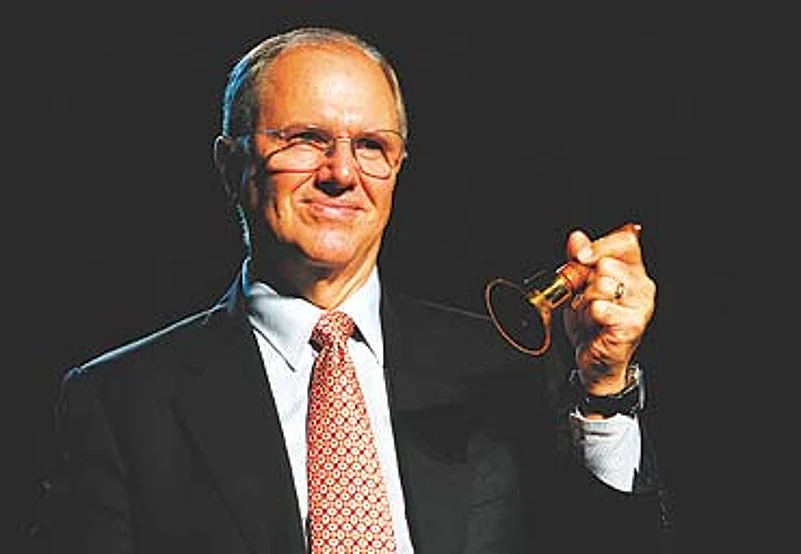Why Protect?
Current rules 'may not be adequate in protecting software' and 'without patents, innovators will be discouraged to innovate'
Copyright offers protection to only the expression, which is the form in which an idea has been expressed and not the idea itself
When something new comes out of research, it must be protected. Mere copyrighting isn't enough.
IP must be protected as that will be critical to the success of a knowledge-based economy
***
"If people had understood how patents would be granted when most oftoday's ideas were invented, and had taken out patents, the industry would be at acomplete standstill today...."
—Bill Gates, chairman, Microsoft, May 1991
"India should stop resting on IQ, and focus on IP (intellectual property). It has tostop selling human capital and start creating IP. To emerge as a knowledge economy, it hasto accord software patents."
—Craig Mundie, chief research and strategy officer, Microsoft, September 2006
***
Ironical, isn't it? It sounds more so when you realise that Mundie isGates reincarnate. A Microsoft communication states he's "working closely withMicrosoft chairman Bill Gates to take charge of the company's research and incubationefforts—in anticipation of Gates' departure from a day-to-day role in Microsoft inJuly 2008." He was in India last week to convince policymakers, industry bodies andmanagers that treading the economic path ahead is full of neck-jerking potholes, unlessit's paved with "software patentability".
To be unfair to him, Mundie (and Microsoft) is almost alone in the endeavour to cajoleIndia to change its laws relating to intellectual property rights (IPRS) and allowsoftware products to be patented. He's supported by players like Adobe Systems India's MD,Naresh Gupta, who feels the current rules "may not be adequate in protectingsoftware," and "without patents, innovators will be discouraged toinnovate". But the majority of the sector—including Nasscom—is at bestlukewarm to the idea and, at worst, thinks it's a stupid one.
But before we embark on this maze of a discussion on software patents, let's take a lookat India's current IPR regime. Software is protected under the Copyright Act, which hasbeen amended twice in the 1990s to conform with WTO's trips (trade-related aspects ofIPRS) agreement, which is binding on all WTO members, including India. Most experts,including Hemant Batra, corporate lawyer, Caden Boriss Consulting, agree that within thecopyright ambit, India probably has the toughest laws.
Therein lies the problem. Copyright offers protection to only the expression, which is theform in which an idea has been expressed, and not the idea itself. For example, it's akinto 'cover versions' in the music industry, where a popular song is sung by other artistes.Or it's similar to process patents in manufacturing, where the same product can be madeusing a slightly modified process. Pharma firms misused this loophole till India wasforced to adopt the product patent regime by the WTO.
Given the copyright environment, there are no points for guessing why Microsoft is pushingfor patents in both India and China. For, in one stroke, it'll solve most of its problemsin countries where software piracy is rampant; the piracy levels in both India (72 percent) and China (86 per cent) are much higher than the global average of 52 per cent. ButMicrosoft contends there's a deeper and a more important reason why India should go the USway in this area. In fact, it says India's future as a knowledge powerhouse hinges on thischange in law—and mindset.

In an exclusive interview with Outlook, Mundie sketches out India's prospects. He says asmall elite in the country realises it has to "move up the (IT) food chain," and "the costs ofoutsourcing in India are going up". At some stage, India will lose its labour costadvantage and the natural evolutionary process will enable competitors like China,Indonesia and the Philippines to take huge bites of the global outsourcing pie. India willhave no option but to graduate into the value-added league. But that can happen only if ITdeployment rises in India, and Indians start innovating and creating products for theworld.
The same rules will apply to MNCs, which are outsourcing research to India. They will stopinvesting if they feel that there isn't adequate protection for ideas. To propelinnovation by both Indians and foreigners in India, the protection regime needs a drasticoverhaul. And what's better than opting for software patents? Agrees Adobe's Gupta,"When something new comes out of research, one has to ensure it's protected. Nothaving a proper IPR set-up will discourage companies. Copyright is not adequate to protectsoftware."
What's important for India is to focus on graduating from a services economy to aknowledge one. Explains Rakesh Bakshi, director (legal), Microsoft India, "Theknowledge economy is all about IP as output and human resource as input. IP must beprotected as that will be critical to the success of a knowledge economy. And software, atthe centre of IPR, has a multiplier effect as it's the main engine for growth in such aneconomy."
Everyone agrees with the vision, but most draw a different roadmap to get there. Softwarepatents aren't even a signpost on this path, at least at the moment. Nasscom's KiranKarnik feels that the US "has gone overboard as far as patents (in software) areconcerned," and "India obviously looks at things in a different way". Headds that Microsoft is making a song-and-dance about software patents only because it's abig loser in India due to piracy. "When you are worried about what's happening here,you have to create a noise so that there's at least a minimum level of tightening,"explains Karnik.
In fact, the open source community, which believes in the copyleft view and opposespatents and copyright in software, says patents will "provide a monopoly over ideas,which is unfair" and "stifle independent thinking". Says VenkateshHariharan, head (open source affairs), Red Hat India, India's near-monopolist vendor ofLinux, an open source software, "Patents are not needed at all. Even copyright is toomuch of a one-size-fits-all model and has a tremendous limiting factor in a knowledgeeconomy."
For the majority anti-patents lobby, the enforcement of existing laws is more crucial."There's no need to rush for patents. If we are able to honour copyright, it's morethan enough," admits Vishnu Dusad, MD, Nucleus Software, which has copyrightedseveral software products. Karnik too blames lack of enforcement, which has led to asituation where consumers don't think of piracy as a serious issue. He adds that having alaw isn't enough. "The Dowry Act is in place for several years, but has it stoppedthe problem or even reduced it?" he asks.
At some latent level, even Microsoft may be comfortable if India can make sure that theexisting copyright laws are implemented effectively. Even Mundie, while talking aboutChina's recent initiatives to curb piracy, can remember the changes at the implementationlevel. For example, the Chinese government has made it mandatory for IT vendors to revealthe break-up between hardware and software costs. This, says the man who's slowly steppingout of Gates' shadows, has made the system transparent and forced companies to instaloriginal software in their machines. As long as the same happens in India, not many willreally care about patentability!
By Arindam Mukherjee and Alam Srinivas






















